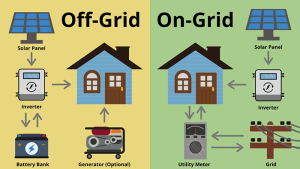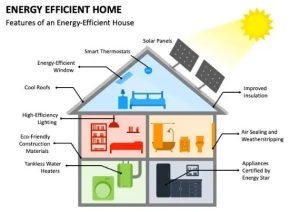

Off-Grid Homes in Eastern Ontario
What is an Off-Grid Home?
An off-grid home is a property that operates independently from municipal utilities such as hydro, natural gas, water, and sewer. Instead, these homes generate their own power, manage their own water supply, and often use alternative heating and waste systems. In Eastern Ontario — with its mix of rural landscapes, lakeside cottages, and forested retreats — off-grid living appeals to those seeking self-sufficiency, sustainability, and independence.
Power Systems in Off-Grid Homes
-
Solar Power: The most common renewable option. Panels generate electricity that’s stored in battery banks for use at night or during cloudy weather.
-
Wind Turbines: Effective on open rural lots, providing supplemental power.
-
Generators: Gas, propane, or diesel backup generators are often used to ensure reliability in extended cloudy or calm periods.
-
Micro-Hydro Systems: Rare but possible on properties with running water, providing a steady renewable power source.
Heating and Cooling
-
Wood Stoves and Pellet Stoves: Traditional and reliable, especially in areas with abundant local wood supply.
-
Propane or Oil Heat: Common for backup or when wood isn’t practical.
-
Geothermal and Heat Pumps: Possible on some off-grid properties but require significant upfront investment.
-
Passive Solar Design: Homes are often oriented and built with large south-facing windows, thermal mass materials, and strategic overhangs to maximize winter heat gain and reduce summer overheating.
Water and Waste Systems
-
Wells: Drilled or dug wells supply fresh water, often paired with solar-powered pumps.
-
Rainwater Harvesting: Collected from roofs into cisterns for domestic or irrigation use.
-
Water Filtration & Purification: UV treatment, sediment filters, or reverse osmosis systems ensure safe drinking water.
-
Septic Systems: Most off-grid homes still rely on conventional septic tanks and leaching beds.
-
Composting Toilets & Greywater Systems: Alternatives used in eco-focused or remote builds to reduce water use and environmental impact.
Lifestyle Benefits
-
Independence: Freedom from utility bills and reliance on municipal services.
-
Sustainability: Reduced carbon footprint and environmental impact.
-
Resilience: Protection against blackouts or service interruptions.
-
Privacy and Space: Off-grid homes are often located on large rural lots or waterfronts.
Challenges of Off-Grid Living
-
Upfront Costs: Solar, batteries, and systems require significant initial investment.
-
Maintenance: Owners are responsible for monitoring and maintaining systems.
-
Seasonal Variability: Short winter days, heavy snow, and cloudy conditions require careful planning in Ontario’s climate.
-
Accessibility: Remote locations may mean longer commutes or limited access to services.
Regional Perspective
-
Cottages & Seasonal Retreats: Many off-grid properties are recreational cottages, particularly in areas like North Hastings, Madoc, and PEC’s more remote corners.
-
Year-Round Residences: Increasingly, buyers are seeking fully functional off-grid homes that support modern living with solar, propane, and advanced water systems.
-
Heritage & Hobby Farms: Some properties combine off-grid systems with agricultural use, appealing to those seeking a self-sustaining lifestyle.
👉 In summary, off-grid homes in Eastern Ontario provide a unique opportunity for independence, sustainability, and connection to nature. With the right systems in place — from solar power to wells and septic — they can offer all the comforts of modern living while reducing reliance on outside utilities.

